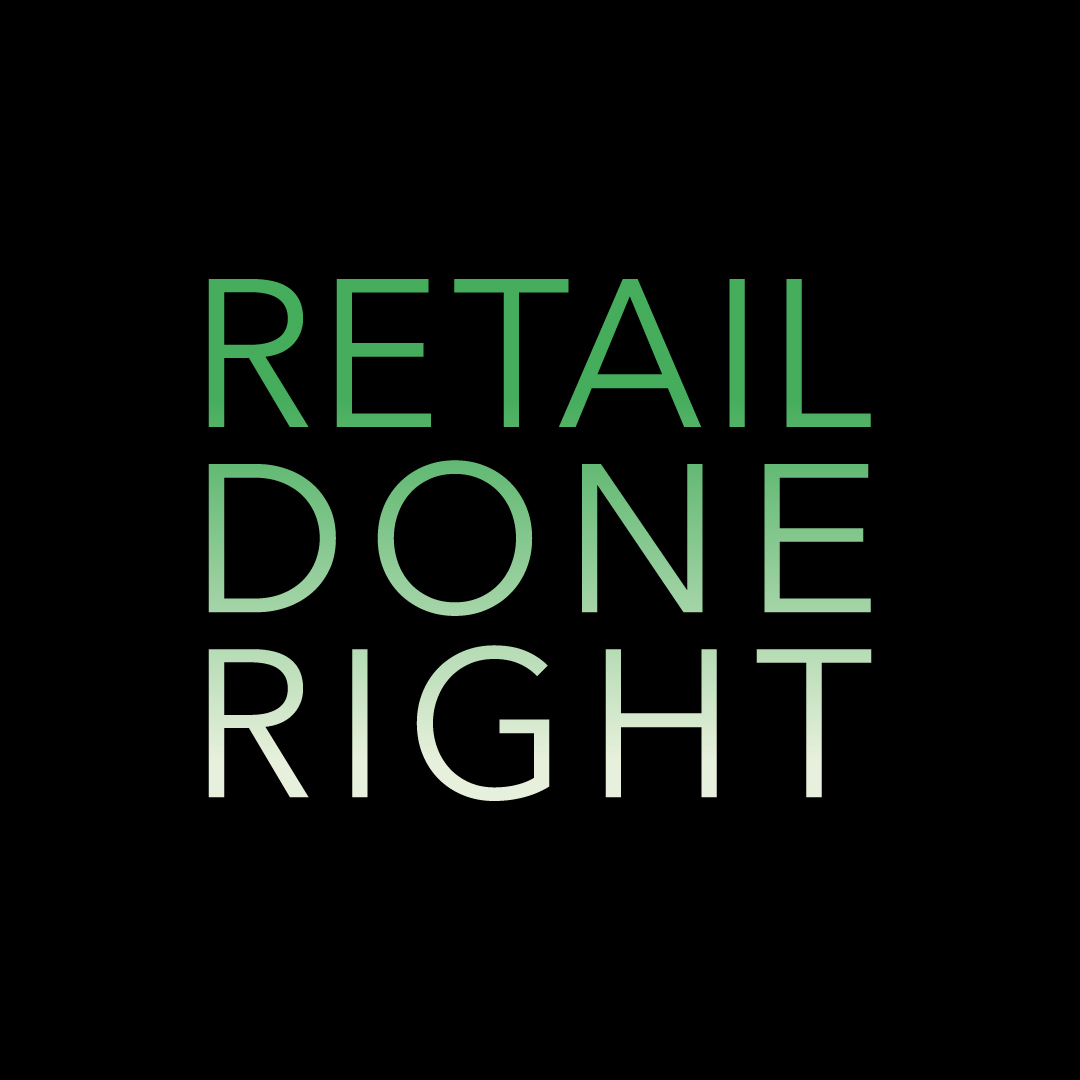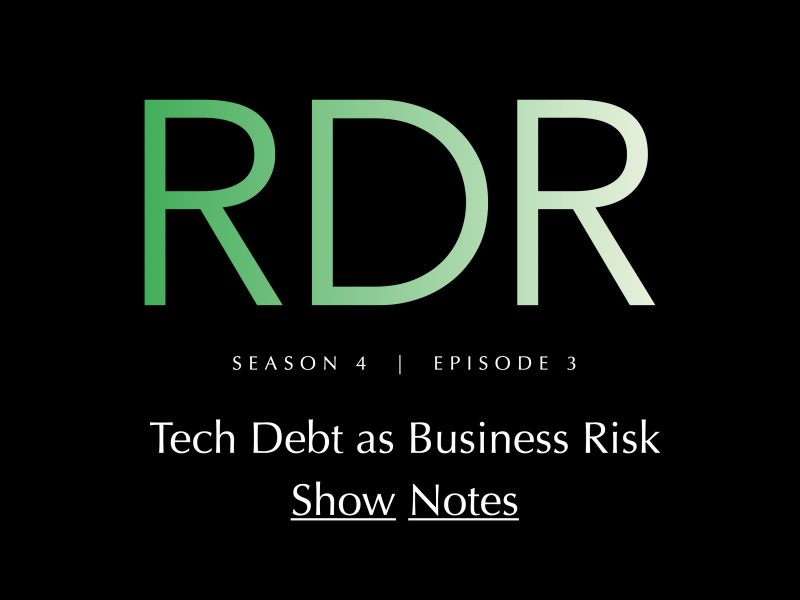Show Notes | S4 Ep3
Tech Debt as Business Risk | Your future retail strategies depend on fixing it
Special Guest: Stu Cartwright
INTRODUCTION
The third episode of our mini-series is titled, Tech Debt as Business Risk.
While it’s called tech debt, it’s really about business strategy – and the ability of the business and the ability of all its systems to respond to customers and changes in the market. Here are a number of articles that provide detailed explanations: Technical Debt Skeletons and Tech Debt: Reclaiming Tech Equity and Tech Transformation in Retail and a personal favorite – an oldie but a goodie on explaining tech debt: Retail’s technical debt comes due
While retail in general is fast to change, its investment in technology systems and data sometimes lags behind. When a retailer has a dollar to invest in anything, it will go to the stores, to customer facing systems to anything but IT.
In 2023, we saw retailers NEED to invest in their tech stack – whether it was the continuation of supply chain projects, or the rush to implement AI. So, IT spending as a percent of revenue was up nearly by half – to 10%. This is about 2/3 of what it is in financial services and about half of what it is in tech companies.
We’re joined by a special guest, Stu Cartwright, who has spent 40 years solving complex IT challenges.
INDUSTRY UPDATES | Our New Segment
This is our new segment for Season 4. We highlight and discuss recent retail-related news.
- Initial reports are that Holiday spending increased… MasterCard SpendingPulse reports that between Nov 1 to Dec 24, spending increased 3.1 percent from a year earlier
- Caution remains with some retailers saying customers are shopping more sales and discounts.
- https://www.nytimes.com/2023/12/26/business/economy/christmas-holiday-spending-retail.html?smid=nytcore-ios-share&referringSource=articleShare
● Nike sinks 12% after it slashes sales outlook, unveils $2 billion in cost cuts
- Continuing on our discussion about softening in the luxury market, the NYT covered: https://www.nytimes.com/2023/11/07/style/luxury-fashion-brands-prices.html
- The absurdity of luxury prices which have risen 25% since 2019. Yet, in some corners, it’s even worse, “Take Chanel, where handbag prices have more than doubled since 2016. The auction house Sotheby’s found a classic 2.55 Chanel bag sold for around $1,650 in 2008. In 2023, that figure from Chanel is closer to $10,200. (If the cost had risen in line with inflation over the 15-year period, it would be expected to cost $2,359).”
- BNPL, Buy Now Pay Later, continues to grow. Adobe reported that BNPL usage set records on Cyber Monday – $940M alone on Cyber Monday, which was a 42.5% YoY increase. YTD thru November, usage of BNPL was up 17%…
- https://news.adobe.com/news/news-details/2023/Media-Alert-Adobe-Cyber-Monday-Surges-to-12.4-Billion-in-Online-Spending-Breaking-E-Commerce-Record/default.aspx
- One example of this is the stock of Affirm is up – way up, we’re talking over 400% as of this recording.
- The delivery service, Shipt, which is owned by Target, is stopping operations in Seattle due to new laws that are going into effect that require gig workers to be paid drivers the equivalent of Seattle’s $17.27-per-hour minimum wage and to receive one day of sick leave for every 30 days of work in the city.
- Business Insider is reporting that multiple Pizza Hut franchisees are laying off hundreds of delivery drivers in February, in advance of a new law that raises fast food workers pay to $20/hr.
- At the other end of the spectrum is Earned Wage Access, EWA, which is alternately a boon and a beast for some retail workers. For some cash-strapped, especially those in retail and the gig economy workers, the solution can be found in an earned wage access app— an increasingly popular service that offers users early pay, often in exchange for a fee, for work they’ve already completed but haven’t yet gotten a paycheck for.
- https://www.vox.com/future-perfect/23863440/early-earned-wage-access-apps-payday-loans-regulation-earnin-moneylion-dailypay
- While Amazon and Walmart offer – and fund these services – others offer them through providers who may end up acting more like predatory lenders through cash advance style programs and fees. Legislation is proposed on both sides of the aisle – one side to loosen restrictions on the lenders and the other to protect consumers
- Zulily is shutting down and liquidating…
- And in follow-up, our favorite guest of season 3, Doug Stephens, is back with a set of 2024 predictions.
- As we close out 2023, Zulily reminds us of some big bankruptcies this year…Rite Aid, Bed, Bath & Beyond, Tuesday Morning, Party City – definitely some big retailers mixed in with the WeWorks of the world…
THE CONVERSATION
We asked Stu to help us understand why tech debt compromises customer experience.
Stu shared that the challenge is IT needs to make sure that what they’re doing works with all the other systems in the organization. That data is safe and protected. That pricing data and revenue recognition are correct. Yet, many retailers, in the name of speed and growth end up with random tools or tools that don’t play well with each other. They solve one thing but cause breakages elsewhere. So, tech debt is incurred when businesses are using systems that aren’t optimized – harmonized – to deliver effectively. The debt part is that this patchwork of systems or older systems actually cost more to support.
- One up, one down mentality
- Lack of shared understanding
- Not built for current or future generations
Here are three examples illustrating how technical debt can manifest in the retail industry:
- Legacy Systems and Incompatibility: inventory management and point-of-sale systems are mission critical and once installed, they’re often locked down. But what happens when – at the holidays – your BOPIS is pegged to a system that doesn’t refresh fast enough and customers continually experience out-of-stocks on their orders.
- Legacy systems can lack the agility needed for modern retail operations. Maintenance for older systems can be costly and time-consuming. But the big one is an innovation tax – when older systems make it hard to integrate with new technologies.
- Sometimes, it’s better to leave certain technologies stand alone in the beginning. But if quick fixes or workarounds remain rather than choosing more sustainable solutions. That creates fragile, subpar systems that don’t scale or integrate well. Then, future changes or updates might require unraveling or redoing these quick fixes, consuming more time and resources.
Jeff asked about cybersecurity. Cristene commented that research from her time at DXC Technologies found that three quarters of retailers said their modernization efforts were essential to cybersecurity and 85% said that they were looking at renovating systems so they could bring in AI and automation.
As we discussed in the last episode, the supply chain is an area of intense focus – with more than half the retail executives we spoke with pursuing projects there. Fixing tech debt is about increasing business agility. As part of the research, cost reduction, more architecture flexibility and improved business agility were selected by ⅔ of our retail respondents in the DXC research.
Cristene ended by sharing that one of the reasons Amazon can dominate retail is the speed and scale of their technical and business infrastructure. That modernization benefits them, and the more than 5 billion estimated packages they ship a year (according to Statista).
CONCLUSION
Tech debt – or a failure to modernize – can lead to:
- Poor customer experience and stock challenges across experiences
- An inability to understand customers and operations effectively and in the moment
- Constraints on innovation and ability to test and scale new approaches – in fact in Cristene’s research, nearly a third said their innovation capabilities are constrained by technical debt.
Fixing tech debt is about increasing business agility. So really – the goal is to focus on modernization because customers deserve a frictionless experience including:
- Micro-moment development and experience management
- Profiles, personalization, preferences and persistence including accessible solutions
- Cross-channel, cross system distribution
- Check out preferences and next generation payments
- Check in preferences including loyalty, couponing
- Store interaction and media detailing (recipes, nutrition, areas shopped, requests)
- In-journey optimization, automation and rules management
HEROES & CHANGE MAKERS
Jeff’s selection SOL PRICE.
- Why? Jeff just want to call attention to someone who has been so influential in retail over the past 70 years. Possibly the most influential person.
- Sol founded FedMart in the 50’s – or copied the idea. Built it up. Then, founded Price Club, which was ultimately purchased by a company we all know and love – that copied Price Club’s idea – Costco.
- Sam Walton credits Sol with teaching him everything he knew about Retail. In fact, Walmart is called Walmart because of Sol and his FedMart. Here’s a quote from Sam: “I guess I’ve stolen – I actually prefer the word ‘borrowed’ – as many ideas from Sol Price as from anybody else in the business.“
- He introduced the idea of discount retailing. He’s the most responsible for the membership model. His principles about how he treated his employees lives to this day at Costco. His approach at Costco with dramatically lower margins (with the savings passed onto their customers), dramatically reduced the number of skus compared to other discount or big box stores was revolutionary. I could go on…
- Jeff doesn’t think there’s a better example of someone who put the customer first in every decision he made…
- Jeff called attention to the podcast, Acquired. You need to dedicate time, but Ben Gilbert and David Rosenthal really do their homework. It’s a great listen…
Cristene selected FOCAL SYSTEMS. So, we’ve been conditioned to think cameras in the store are around theft or sometimes shopper metrics… but what if you pointed that intelligence – the same stuff that helps self driving cars – at making sure the shelves were stocked. As retailer talent is hard to find and even harder to keep, making sure you can point talent at delivering the best to customers – in stock, planograms and other areas is valuable. And since we are in an episode about modernization, Cristene thought Focal Systems is a great choice to help retailers get there.
This is RETAIL DONE RIGHT. Thank you for listening. And please join our conversation.
- Michael Cooke via Upwork is our brilliant sound engineer and editor – and Jade Siriswad composed our theme music.
- Please subscribe on Apple Podcasts, Spotify, or your favorite podcast platform.
- Please follow us on Instagram at retail done right and at our website https://retaildoneright.net
Let’s go shopping!
Jeff Fisher & Cristene Gonzalez-Wertz
Connect with Jeff on LinkedIn
Connect with Cristene on LinkedIn
RETAIL DONE RIGHT is produced, written and hosted by Jeff Fisher & Cristene Gonzalez-Wertz

